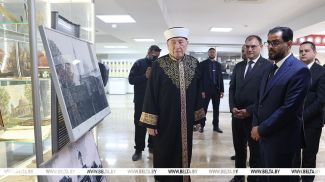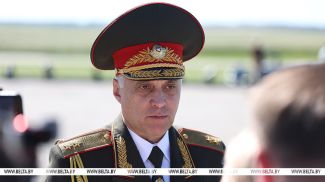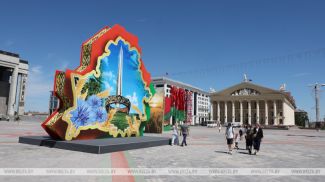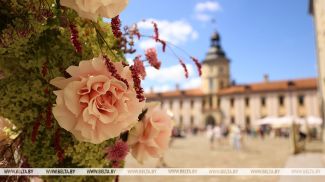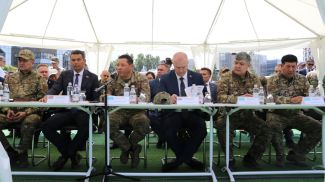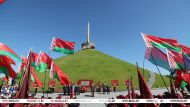Shklennikovo repeated the sad fate of Khatyn: on 27 September 1943, the Nazis burned the village to the ground as a punishment for collaboration with partisans. Fifty-eight households were turned into ashes. The elderly, the disabled were burned alive. Only a handful escaped death by running to the forest where they hid for more than a week. Young people were taken to Germany for slave labor. The Nazis did not spare women and babies.
In the Year of People's Unity the board member of the Belarusian Union of Women, BelTA journalist Alina Grishkevich is writing, in cooperation with the Belarusian Union of Women, a series of reports about women. The series continues with a story about two women from Shklennikovo - the living witnesses of the fascist massacre of civilians: 94-year-old Maria Kuprevich and 81-year-old Tatiana Chernyavskaya, who miraculously survived that tragedy. Their stories are closely woven into the history of Belarus. The Great Patriotic War that broke out 80 years ago interrupted the peaceful life of the country and that of the young girls. The war has not really gone away. It lives in the hearts of people, in war obelisks and monuments that dot the blood-stained Belarusian land.
Shklennikovo
As you enter Shklennikovo, which took a long time to get back on its feet after the war, you see a modest obelisk. It features the names of the villagers killed during the war. There are 15 of them, but they say that the number of victims was more. Among them was my great-grandfather, Adam, who died a terrible death on that fateful day...
Shklennikovo is the birthplace of my ancestors. Here before the war they lived a peaceful, quiet life. My grandmother Felka used to tell me that they were a close-knot family. Their house stood on the outskirts of this beautiful forest village, next to a school that was never restored after the war. Before the war, Maria went to this school. So did my father. By the way, famous Belarusian writer Maxim Tank, who hailed from the nearby village of Pilkovshchina, attended the Shklennikovo school for several years in the 1920s.
Maria Kuprevich
Pre-war life
Maria was born in 1927. She was not even 14 when the war broke out. The villagers called the fragile blue-eyed girl Marilyka. It was a peaceful and carefree time…
The forest village of Shklennikovo lived a normal life. People did their routine farmer's work.
Men built houses, did craftwork. During long winter evenings women weaved bed covers, embroidered towels, tablecloths, and shirts. In the summer there was a lot of work out in the fields: growing potatoes and grain crops, taking care of cows and sheep. They also went out to the woods to collect mushrooms and berries. The Shklennikovo residents lived their lives, raised children and grandchildren, got together to sing and dance…
Maria remembers my grandfather well. Their houses stood opposite each other. Maria Kuprevich's household had a water well which they happily shared with my grandparents. The neighbors lived very amicably.
Volodya's father, Adam, was a widower, Maria reminisces. "Adam's sons, Volodya and Khvyados, grew up without mother, but were kind and hardworking, helped their father a lot. When their father remarried, things became harder for them: the woman did not love her stepsons. Then the family had a son and a daughter. Volodya inherited carpenter's skills from his father Adam, who before the war fell ill and had difficulty walking. The grandmother Felka was very good at singing and was often invited to weddings and village gatherings," Maria recalls.
“My parents had five children. We were a poor but close-knit family. Volodya and Felka had one son, Tadik. So things were better for him, he was better fed up. Life was harder then and we lacked many things that are in abundance now. However, people were healthier then,” Maria said. “I also remember that on the way to school we used to stop by Felka's house. Her house was always very tidy. The village life was hard, and actually there was no time to keep things clean and tidy. She used to hang handmade linen sheets to dry outside and they always looked crystal clear, smooth and beautiful. That moment is etched in my memory. I also remember that your father was a good dancer.”
My grandfather Volodya was a skilled carpenter. He made chairs, tables, doors, and chests for the villagers, some of them are still in use.
According to Maria, once when plowing land Volodya hit a mine, apparently left over from World War I. The mine damaged his hand and made him handicapped. This was an echo of what seemed to be the long-held military battles.
...The Naroch land is soaked with blood of the heroes who defended their homeland from the enemy first during World War I and then during World War II, which broke unexpectedly, destroying plans of many and taking countless lives.
Youth scorched by war
Maria's youth was ruined by the war and scarred by the pain and the sufferings of her fellow villager. Several partisan detachments operated in the forests of Naroch. Local residents, including those from Shklennikovo, actively assisted them. They cooked food for them. The women knitted and sewed things for them. Everyone stood together to help as much as they could to end the war. The Germans responded with punitive operations…
In 1943, Maria was 16 years old. She still remembers that September day, which turned into a nightmare by the evening. The place was put on fire that soon turned a peaceful village into ashes, leaving behind only a linden tree that still rustles in the wind, as if reminding people to remember the tragic day.
...On 26 September 1943, a column of soldiers and policemen marched from Knyaginin towards Myadel. The residents of Shklennikovo heard the sounds of the approaching motorcycles. People began running away towards the swampy area near the villages of Sivye and Nevery. The elderly, sick, disabled and children remained in the village.
94-year-old Maria Kuprevich recalls: “It happened on the Exaltation of the Holy Cross Day. The day was sunny and warm. No one knew what the day had in store for us. The residents of Shklennikovo collaborated with the partisans and the Nazis decided to punish the people for that. I remember how we ran in fear into the woods through the field, followed by machine-gun fire. Some people stumbled and fell and the Nazis brutally finished them off with rifle butts. Those who were younger and faster managed to escape. My mother, my father, my two sisters and I ran away.”
The woman's suffering and pain have not faded with time. Her grandmother Magdalena Malko and aunt Kristina Malko were burned alive.
She continues her story: “My aunt Kristina, who had been disabled since childhood, hid in her house under the stove and was burned alive. She died a terrible death, poor thing. It is impossible to imagine dying in fire, in great pain. Before she died she kept telling my father: Aleksei, stay with me, the Nazis will not dare touch us. My father asked her to go to the forest. My aunt decided they would hide in the house...”
Maria's brother managed to escape and later joined the partisans. Her other brother and her uncle were taken to Germany for slave labor.
According to the eyewitness accounts, on that day the Nazis herded the men, women, and children into Roman Misuna's house and locked them up. The people, scared to death, spent the whole night without sleep. In the morning of 27 September, the Nazis began to sort them: the old, sick, handicapped and those who were crying and moaning were herded in one place. All the others were rounded up in another and were later taken to Germany for save labor.
The Nazis took people back to their houses and barns and shot them with submachine guns and then finished them off with single pistol shots.
Several members of Viktor Cherniavsky's family were killed in their barn.
The Nazis also showed no mercy to Ksenia Glinskaya and her little daughter Yuzefa, who were returning home from the nearby village of Skorody.
My great-grandfather Adam Grishkevich, a neighbor of Maria, was taken to the school building. He tried to escape but the Nazis caught him. The Nazis fired a round at him, then placed him on firewood and set fire. Today his name is among the names etched on the memorial.
People were burned alive to horrible screams of their relatives. I cannot listen to these heart-wrenching stories without tears. It is as though I relive those moments again…
When the Germans left and the fires died down, one of local partisans, some said it was Alfon Chernyavsky, came to the village. He accidentally found a shred of the blouse of his mother, Vintsulya Chernyavskaya, near the smoldering ashes. Crying bitterly, the man wandered around the village, gathering remaining human bones. The obelisk in Shklennikovo stands at the site where he buried the remains.
Maria Kuprevich with her relatives and other villagers were hiding in the forest for more than a week. German soldiers canvassed the forest on bikes, trying to find those who had escaped to kill them. She remembers fear, cold, hunger and the haunting stench of the burning village. The sky was ablaze, reflecting the fire from the houses burning down together with their owners.
Later, when everything calmed down, the escapees returned to their homes that were destroyed by the Nazis. The people had nothing but the clothes they had on them when fleeing to the forest, scattered over the neighborhood, finding refuge at their relatives' homes.
My grandparents with their son found shelter at their relatives in the neighboring village of Olsevichi: Lenya Khilo (her husband was on the frontline) and her daughter Maria welcomed the survivors and found place for everyone in their small house. They lived together for around three years, until my grandparents built a new house on the outskirts of Shklennikovo. They never forgot the hospitality and kindness of their relatives. Mercy and compassion were more than just words for them during those times.
Maria Kuprevich, her parents and two sisters ended up in the village of Sivyye. “The people who took us in had a large family themselves. They built us several beds from pieces of the fence, so that we did not have to sleep on the floor. They shared with us what little they had. I shudder to remember what we were eating… We added grass to bread and lived on bread and water in winter. Luckily, there was some grain and potatoes stored for winter, which helped us survive,” Maria Kuprevich recalled.
The woman was almost captured by Nazis for the second time. “Once I went to visit my aunt in the village of Zani that was 25 kilometers away to ask for food, because we wer starving. We barely escaped the Germans who came to the village right at that time. We hid in the forest again. God saved me from death one more time.”
War took my first love
A partisan unit was quartered in Sivyye for a while. It comprised not only the locals, but also young people from other places. “The partisans shared food with us. Sivyye was also a partisan village… There were also Jewish people in the unit – beautiful girls and boys. We made friends,” the woman said.
Maria Kuprevich remembers her first love with deep sadness to this day. She even looked younger when she was talking about her first feelings and dreams that never came true because of the war. “There was one handsome young lieutenant, a Jewish man, his name was Aleksandr, and we liked each other… When they came to our house, we talked and talked about everything, finishing each other's sentences, forgetting about the war… His friend used to ask him why he wanted to spend time with me, a Jewish man with a Belarusian girl,” she recalled with sadness.
“Now everyone marries whoever they want, regardless of ethnicity. For example, the families of my grandson and nephew have members with the Jewish ancestry. All this makes no difference now, feelings are the most important thing, regardless of who you are: Jewish, Belarusian, or Russian. It was different in the past,” Maria Kuprevich noted.
“I liked him very much, and he liked me. He used to tell me that my blue eyes were beautiful, that he would never forget them. I was sixteen then. I do not even know how old he was. He came over again and again while his unit stayed in the village. We would spend time together, we did not need anything else, we were just drawn to each other… No one of those partisans came back from the war, all of them were killed. This is so tragic…,” Maria Kuprevich said.
It is hard to accept that the war ruined people's lives like that, taking everything from them: their homes, their first love.
Postwar dugouts
After the war, Maria Kuprevich came back to Shklennikovo. Some soldiers and families also returned – some from the frontline, others from Germany. Her brothers also came home alive.
The war ended, and people felt the greatest joy, they were happy that all the suffering and ordeals had ended. Of course, in the post-war years people faced many difficulties as they lived in dugouts, they were very poor and did not know, when all of them would have enough food on the table every day.
Maria Kuprevich's father, who was a good bricklayer, built a new house in the place where the old house stood before the war. By the way, he lived up to 100 years old. Their neighbors, including my grandfather and grandmother, also built new houses. Things were getting better slowly but steadily.
Marriage with afrontline soldier
In 1948, Maria Kuprevich, 21, married her boyfriend from Shklennikovo, frontline soldier Yulyan. In the army he had a leg injury and it was bothering him for the rest of his life.
"The post-war years were very difficult. I married him, and he did not even have his own house. It was not easy to build a new one… There was scarcely anything to eat. Oh, it was so difficult,” she sighs. “Some people were starving after the war, but they had to build new homes. And good houses were built. Some of them are still standing in the village.”
Two daughters Anna and Irina, and son Anatoly were born later. The parents had to work really hard to provide for such a big family. Maria Kuprevich and her mother-in-law lived under the same roof.
She remembers the moment they had a new weaving loom. It was a big day for the whole family. Women processed flax from their own garden and made linen clothes for themselves and their children. They also made wonderfully embroidered towels, tablecloth and bedsheets. They taught their daughters to weave and make beautiful things from linen.
Maria Kuprevich says that hardworking and humble women from their village did field work, made clothes at home, cooked, gave birth to children and raised them in peace and harmony. There were marriages with homemade bread, old songs and rites. Traditions were passed from generation to generation as such continuity has always been important for Belarusians.
Maria Kuprevich's husband worked as the chairman of the rural council and as a foreman. It was a very honorable job at the time. Family members still keep his briefcase as a relic. He passed away long ago, but the family still keeps pre-war metrics, post-war awards and important documents in that briefcase.
"When I start telling my grandchildren about my life, about the war, about people's hardships, they listen to me very carefully, they try to remember everything and ask many questions,” Maria said.
Now she lives with her son and his family in the district center, near the parental house of renowned Belarusian actress Maria Zakharevich who always visits her neighbors when she comes to her native place from Minsk.
Maria Kuprevich has many good memories about her native village. “I remember all roads and paths, all meadows. I remember picking berries and mushrooms in local forests. My granddaughter Tanya, who now lives in Moscow, used to spend every summer with me when she was a little girl. She also remembers our village and visits our dear Shklennikovo every year. I have very good children and grandchildren,” the woman said.
"Peace and health are the most precious things in life. It is good when two people live together in love, friendship and accord,” the war survivor from Shklennikovo believes. Maria often calls her old friend from the same village Tatiana Chernyavskaya, and the two women talk about their memories for hours.
Tatiana Chernyavskaya
Tatiana Chernyavskaya, 81, has lived in Shklennikovo for all her life. During the war she was taken to Germany together with her family for slave labor. On the tragic day of the village burning she was only three years old.
"Of course, I do not remember much. My mother told me how it happened. My uncle was executed, and my mother, brother and I were taken to Germany. At first, we had to walk, then they put us in a railroad car. It was crowded and stuffy,” Tatiana reminisces with tears in her eyes.
In captivity her mother and brother worked for the Nazis, lived in fear and starvation. They could not even imagine that it would end someday and that they would come back home.
“We came back only two years later, in the victory year of 1945. Everything had been destroyed. People were poor and starving. The family had to begin everything anew. “We dug out an earth house and lived in it just like everyone else. So much sorrow,” Tatiana Chernyavskaya recalls. “I still feel it… So much pain and horror.”
She points to photos of her family on the wall and talks about each relative. She remembers them deep in her heart.
One way or another but she had to work hard her entire life. She did not marry. When her family was alive, life was easier when they stayed together…
Every day Tatiana Chernyavskaya approaches the obelisk in order to bow to the memory of the dead.
“You are young. You should preserve peace,” says the woman who witnessed the war, the burning of the village and its revival.
Maria Kuprevich and Tatiana Chernyavskaya weep when they talk about the war. The pain still lingers after 80 years. They know the price of peace and a happy life in the native land.
Aroma of the childhood and the memory of the war
The house where my ancestors lived in Shklennikovo is no more, just like the school that used to be there before the war. A pear tree grows there and it bears fruit which taste I still remember as the sweet taste of my childhood.
… The aroma of my childhood, of grandfather's pears filled me in Paris, in the studio of the French Belarusian Boris Zaborov where I saw his work Gumno for the first time several years ago. Such a stackyard where many kept their hay is part and parcel of the Belarusian village. In the Paris studio the image of the stackyard in the veil of either fog or time, featuring a cart wheel and nearly invisible outlines of trees, possibly pear trees, got me thinking about my childhood.
Paris, Zaborov's studio, his famous painting – I somehow linked all of it to my great grandfather Adam and his unforgettable pears.
…I don't know what the life of my family would have been, who they would have become if that tragedy had not happened. But I know one thing well: people everywhere want peace and a calm and happy life for their families. In France, Belarus, or any other country.
As I come to the obelisk to bow to my great grandfather Adam, I feel unalleviated pain… And every time I cannot stop thinking: how could it happen? Millions of people, whose fates or lives of their grandfathers were taken by the war, have had this thought too. It is impossible to understand how such a dreadful war that became a tragedy for my compatriots and inflicted irreparable losses and incessant sorrow on many nations could have happened.
When I hear about attempts to step up military tensions in other countries where innocent people die, I cannot comprehend: has the world forgotten about the tragedy of World War II? How can any sane person thoughtlessly deprive innocent people of the happiness of a peaceful life?
As I talk to witnesses of war and see that Germany accedes to some sanctions against Belarus, I always think: does a nation, whose nationalists are to blame for the dreadful tragedy of many people, for the death of my grandfather and thousands of my compatriots, have the right to act against my country?
A commemorative ally
A commemorative rally has been held in Shklennikovo on 27 September every year for the last few years.
Witnesses of those dreadful events also participate in this rally. Grannies from a flaming village… They are so close to my heart. In my opinion, those are people of the highest caliber of kindness and spirituality. They have lived through the war, famine, post-war ruins and troubled years. They still remember it and pass this memory on to the descendants.
In my opinion, this link between generations is very important, particularly in our day and age.
On 27 September 1943 eight villages were destroyed in the Svatky rural area of Myadel District alone. The Nazi destroyed and burned down a total of 68 populated localities in the area of Lake Naroch during the war.
German invaders destroyed about 9,200 populated localities as a result of punitive expeditions in Belarus. Many of them were burned down together with some or all of their residents. As many as 186 villages were never revived because all their residents, including mothers and babies, feeble elderly people and people with disabilities, were eliminated. The Nazi's policy of genocide and scorched earth in Belarus resulted in the death of over 2.2 million people, who were killed in the three years of the German occupation. Every third Belarusian died.
…Decades go by, generations change, spring thunderstorms roll over the planet and the land wakes up after winter, gardens bloom and skylarks come back to herald in a new spring in the peaceful sky above the peaceful Belarusian land.
Alina Grishkevich
BelTA





